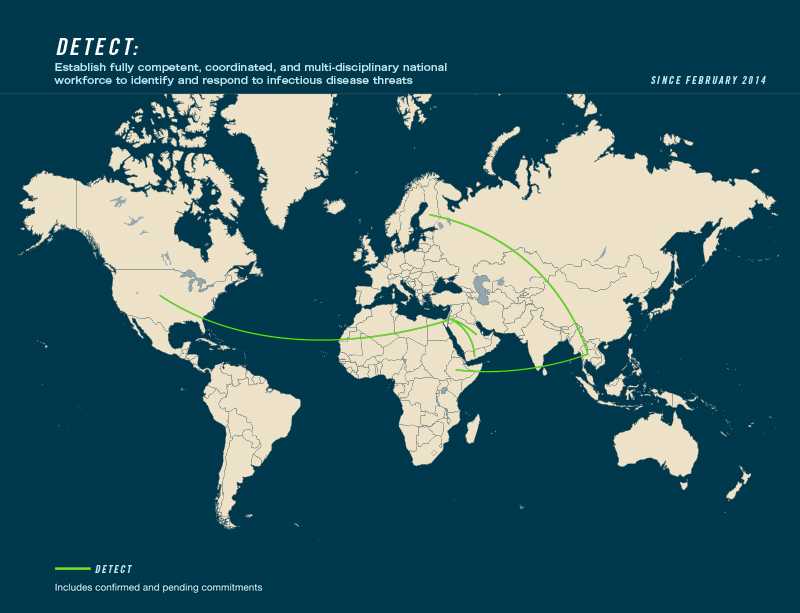Global Health Security Agenda: GHSA Workforce Development Action Package (GHSA Action Package Detect-5)
 Five-Year Target: A workforce including physicians, veterinarians, biostatisticians, laboratory scientists, farming/livestock professionals, and at least 1 trained field epidemiologist per 200,000 population, who can systematically cooperate to meet relevant IHR and PVS core competencies.
Five-Year Target: A workforce including physicians, veterinarians, biostatisticians, laboratory scientists, farming/livestock professionals, and at least 1 trained field epidemiologist per 200,000 population, who can systematically cooperate to meet relevant IHR and PVS core competencies.
As Measured by: One trained field epidemiologist per 200,000 population, and one trained veterinarian per 400,000 animal units (or per 500,000 population), who can systematically cooperate to meet relevant IHR and PVS core competencies.
Desired National Impact: Prevention, detection, and response activities conducted effectively and sustainably by a fully competent, coordinated, evaluated and occupationally diverse multi-sectoral workforce.
Country Commitments to Action Package:
- Leading countries: Jordan, Thailand
- Contributing countries: Ethiopia, Finland, Saudi Arabia, United States, Yemen
- Contributing international organizations: FAO, OIE, WHO
Five-Year Action Items:
Actions will be coordinated, as appropriate, with relevant international organizations including FAO, OIE and WHO.
- Implement the workforce development strategy and plan.
- Establish and strengthen rigorous, sustainable training programs for public and veterinary health professionals. Utilizing established ministerial relationships and existing programs such as the Field Epidemiology Training Program (FETP), efforts should emphasize practical, hands-on experience and provide mentorship, guidance, and technical expertise to support Ministry of Health, Ministry of Agriculture and other officials. Areas of competency will include field-based epidemiologic methods (including outbreak investigations, planned epidemiologic studies, and public health surveillance analyses and evaluations), evidence-based decision making, development of effective public health programming, and fulfillment of core IHR and PVS core competencies, leading to the development of timely and effective public health interventions.
- Strengthen national networks to share resources, scientific data, and best practices and to enhance the country’s ability to fulfill relevant IHR and PVS core competencies.
- Strengthen international and regional networks to share resources (trainers, training material, etc.), scientific data, and best practices with other countries.
- Foster opportunities for joint investigations, trainings and epidemiological studies among neighboring countries.
- Foster and expand the public health workforce at the district and provincial levels. Expedite progress on the goal of at least 1 trained field epidemiologist per 200,000 population by expanding basic and intermediate-level FETPs via a tiered approach to produce well-trained public health workers capable of conducting timely outbreak detection and investigation, public health response, and public health surveillance.
Baseline Assessment and Planning Activities
- Identify and collaborate with partners in the Ministry of Health, Ministry of Agriculture, public health institutes and other relevant local, national, and international entities.
- Create a workforce development strategy and plan to strengthen all levels of national public health systems and build capacity system-wide and in critical disease-specific programs. The plan should include physicians, veterinarians, biostatisticians, entomologists, and laboratory scientists and feature a budget with identified funding sources. The plan should result in at least one trained field epidemiologist per 200,000 population, capable of using data to prevent, detect and respond to well-known public health threats and emerging infectious diseases of human and animal origin.
- Establish a Field Epidemiology Training Program.
Monitoring and Evaluation Activities
- Determine whether a national strategic plan is in place.
- Monitor the number of trained public and veterinarian health professionals graduating annually from each level (beginner, intermediate, and advanced) of the Field Epidemiology Training Program.
- Monitor the outputs conducted by participants and programs for quantity (process) measures, impact measures and relevancy to health security.
- Page last reviewed: December 24, 2014
- Page last updated: December 24, 2014
- Content source:
Global Health
Notice: Linking to a non-federal site does not constitute an endorsement by HHS, CDC or any of its employees of the sponsors or the information and products presented on the site.


 ShareCompartir
ShareCompartir